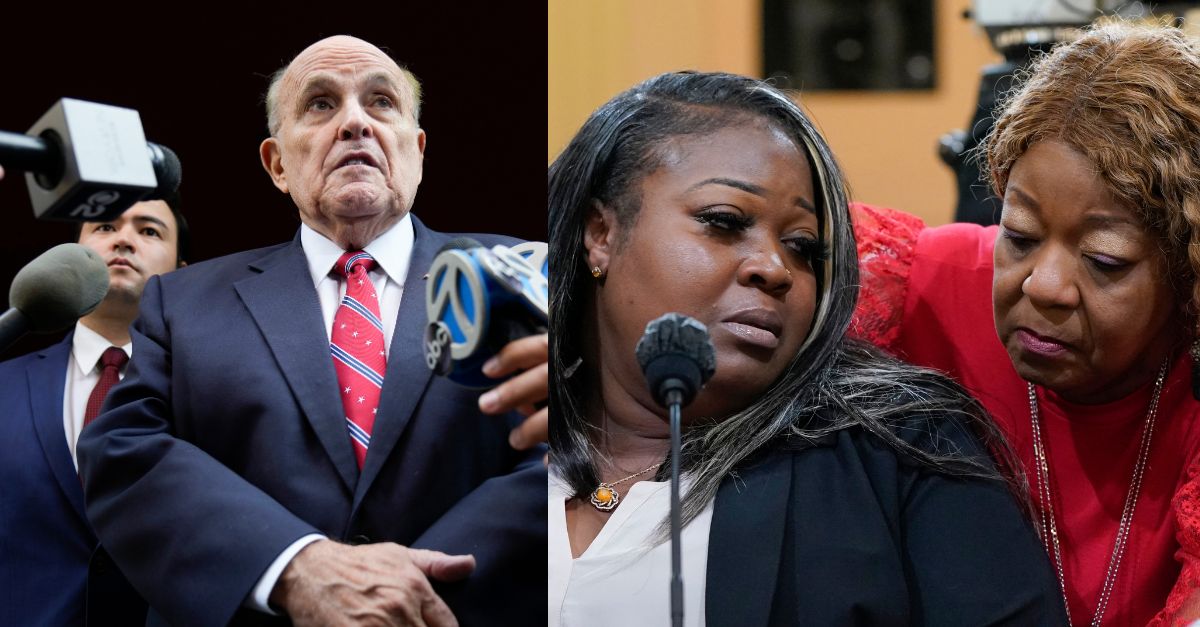
Rudy Giuliani (left) speaks to reporters as he leaves his apartment building on Aug. 23, 2023. (AP Photo/Seth Wenig), Wandrea ArShaye “Shaye” Moss (center), a former Georgia election worker, is comforted by her mother Ruby Freeman (right) on June 21, 2022. (AP Photo/Jacquelyn Martin, File)
A jury will decide how much former NYC Mayor Rudy Giuliani owes 2020 poll workers in Georgia for falsely accusing them of being in on a plot to steal the election from client Donald Trump, a top Washington, D.C., federal judge ruled on Sunday.
Chief U.S. District Judge Beryl Howell wrote that while there was a “lack of clear binding precedent” in the D.C. Circuit on whether a plaintiff’s right to a jury trial exists once a defendant defaults and is found liable for damages, she flexed her inherent authority to keep a Dec. 11 jury trial date in place and rejected Giuliani’s “significantly tardy” eleventh-hour bid for a bench trial on damages. Giuliani’s delay tactics were central to Howell’s ruling.
In late August, Howell, a Barack Obama appointee, wrote that Giuliani’s “willful shirking of his discovery obligations” throughout the case necessitated default judgment as a sanction, “holding [Giuliani] civilly liable” for Ruby Freeman and Shaye Moss’ claims of “defamation, intentional infliction of emotional distress, civil conspiracy, and punitive damage[s][.]”
Since that ruling, Giuliani has been “on notice” that a jury trial would decide damages, but he waited until Nov. 20 — “less than one month before the scheduled start of trial, all while conferring with plaintiffs in preparation for a jury trial” — to file a “a short one-and-a-half page ‘Trial Brief”” arguing that “a jury trial is inappropriate on the issue of damages when a Court has issued a default judgment as a sanction.”
The Giuliani “Trial Brief” filing was “significantly tardy,” having been submitted well past a court-ordered deadline for pretrial motions, the judge said.
“While accepting as the explanation for the delay that defense counsel ‘did not discover the applicable case law until he began preparing for the pre-trial submission,’” Howell responded, “and appreciating defense counsel’s prompt communication thereafter in a two-sentence email to plaintiffs’ counsel about this issue, the fact remains that the filing of defendant’s ‘Trial Brief’ on November 20, 2023, was significantly tardy, more than one month beyond the October 16 pretrial motions deadline proposed by the parties and ordered by the Court.”
Howell, noting that Giuliani “repeatedly flouted basic preservation and production duties, frustrating plaintiffs’ procedural rights to obtain any meaningful discovery in this case,” said she would not “reward” Giuliani for this conduct. In one paragraph, Howell essentially wrote that Giuliani had brought this all on himself [some citations removed for easy of reading]:
Giuliani switches gears in reply to assert for the first time that he would “be severely prejudiced” by a jury trial “because a default sanction is inherently prejudicial” and he would not “get a fair trial on damages with a jury who is being read the contents of the Court’s Sanctions Orders[.]” The irony of this assertion must be highlighted, given the many opportunities Giuliani was afforded to comply with his discovery obligations but to no avail, and the further opportunities Giuliani was afforded to be heard on any adverse instructions to be given to the jury, but he consented to those instructions. Giuliani’s own discovery misconduct necessitated the entry of default judgment against him, and this Court will not reward him for conduct that has “already [] resulted in significant prejudice to Plaintiffs,” particularly where “Giuliani’s delay [would] inflict additional costs on Plaintiffs that were entirely avoidable had [he] exercised reasonable diligence” […]
Beyond that, Howell said, a jury trial is preferable to a bench trial for several reasons, including that Giuliani “plans to raise factual challenges to the scope and extent of damages owed and to cross examine plaintiffs and their experts about any claimed harm.”
“Quantification of damages, particularly where, as here, such calculation will require resolution of factual disputes and credibility assessments, falls within the traditional province of a jury,” Howell wrote. In addition, shifting from jury trial to bench trial would prejudice Freeman and Moss “by making them incur expense and expend resources unnecessarily due to the tardy filing,” the judge said.
In closing, Howell repeated that she would not reward Giuliani for discovery misconduct [some citations removed for ease of reading]:
In sum, having already scuttled plaintiffs’ right to “obtain relevant evidence both to support their claims and rebut any defenses,” Giuliani will not now be rewarded with his effort to abrogate plaintiffs’ properly pleaded demand for a jury trial on damages, particularly under the circumstances of the instant case, where the quantification of damages, an issue Giuliani contests, will require the evaluation of witness credibility and the resolution of factual disputes — matters within “the exclusive function of the jury,” Huggins, Ltd., 727 F.2d at 1234 — and where sustaining Giuliani’s tardy objection to a jury trial would compound the prejudice to plaintiffs.
Read Howell’s ruling here.
Have a tip we should know? [email protected]

